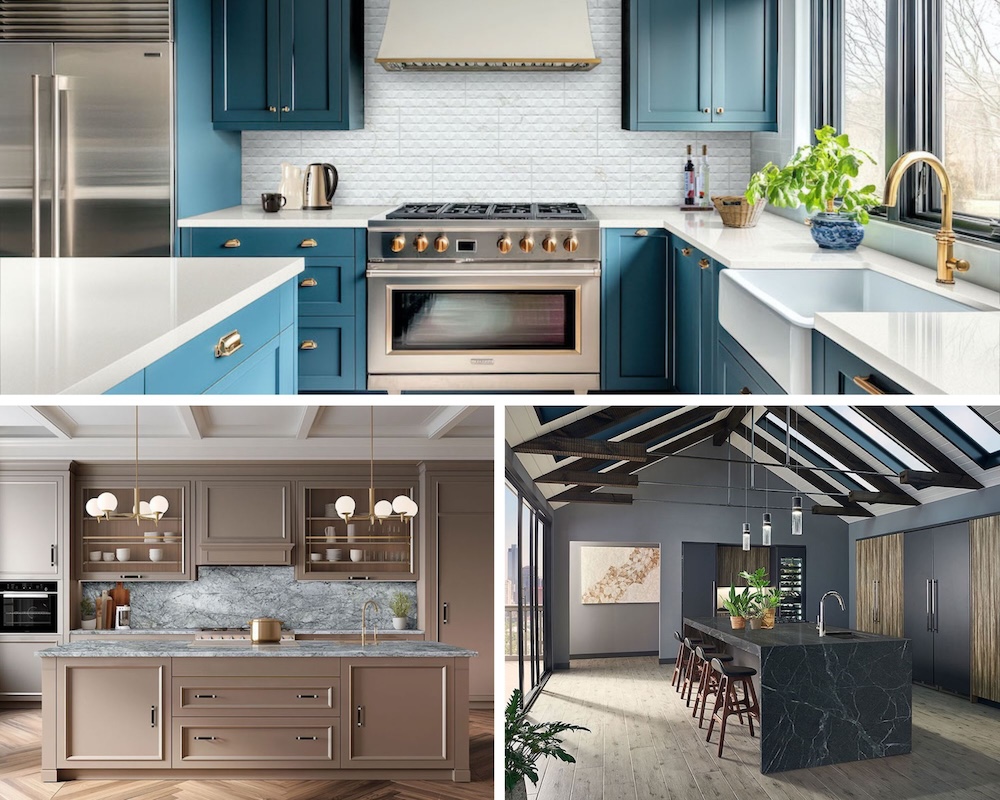
Choosing a countertop can be overwhelming, with seemingly endless options. This decision can significantly impact your kitchen’s design direction, as it’s one of the three key elements. You’ll need to consider natural and man-made materials, colors, patterns, finishes, and edges. While you may admire a friend?s countertop, keep in mind that it’s not a one-size-fits-all decision. To make the right choice, it?s crucial to find a countertop that fits both your style and lifestyle.
When it comes to selecting a countertop, the options seem nearly endless, especially when the surface you choose can determine the overall design direction of your cooking space. After all, it is one of the three main design elements of any kitchen. From natural or man-made types to colors and patterns to finishes and edges, there are a lot of choices to make. While you might marvel over a friend?s countertop, you must remember they are not a one-style-fits-all decision. Yet, in addition to finding something that reflects your fashionable style, it?s so important to consider which countertop also makes sense for your specific lifestyle.
Whether your kitchen functions as the hub for dinner parties, daily lunch prep, or occasional science projects, it handles a fair amount of wear and tear, and the kitchen countertops literally play host to it all. You might not consider the amount of abuse they will take over the years, but you should, since there are some surfaces that stand the test of time better than others. That?s why when you?re shopping for new kitchen countertops, you want to be sure your choice will breathe new life into your kitchen design, require the amount of maintenance you can handle, and last for many years to come. Let us guide you toward the countertop material you need by digging into the details of these top kitchen countertop picks!
Quartz Countertops
One of the most durable countertop materials is quartz. Often referred to as engineered countertops, quartz countertops are actually composed of 93-percent loose quartz crystals that are pigmented and then bound together with resin, which makes up the remaining 7 percent of the man-made countertop.
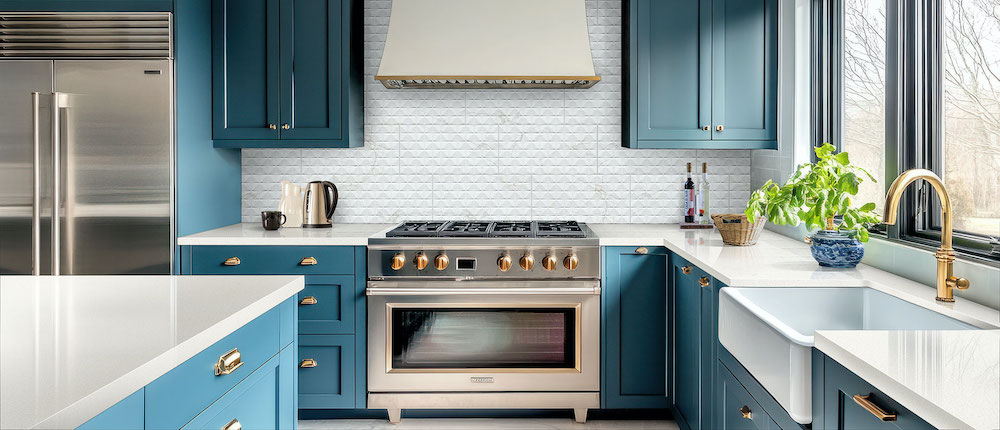 Featured: Arctic White Quartz
Featured: Arctic White Quartz
Mirroring the natural world without the risks of natural imperfections, quartz surfaces require less maintenance compared to natural stone countertops. The non-porous surface resists bacteria and dirt and is nearly indestructible because it withstands heat, scratches, and stains. Unlike natural stone, it never needs to be sealed or polished, and cleaning is a breeze with just a damp cloth or some mild soap on a soft sponge. While water can be problematic for some stones like marble, quartz is waterproof, so it is ideal for use with undermount kitchen sinks.
One of the reasons quartz countertops have become so popular is that the manufacturing process has been nearly flawless perfected. While natural stone options are shaped by Mother Nature’s patterns, advancements in quartz manufacturing have produced a material that closely resembles natural stone. As a result, more people are choosing engineered versions of their favorite designs colors. The added pigments allow for a much wider range of quartz countertop colors and patterns than what you?ll find with natural stone. When it comes to marble-look quartz, this is the closest option you will get to real marble but without the worries of staining and high maintenance.
Granite Countertops
Granite is the undisputed top choice for countertops, and for good reason. This natural stone is both gorgeous and incredibly durable, making it a favorite among homeowners worldwide. That being said, it’s essential to consider your budget when choosing granite, as its price can vary significantly depending on the color and quality. While exotic, high-end colors can be quite pricey, simpler and more affordable options are also available.
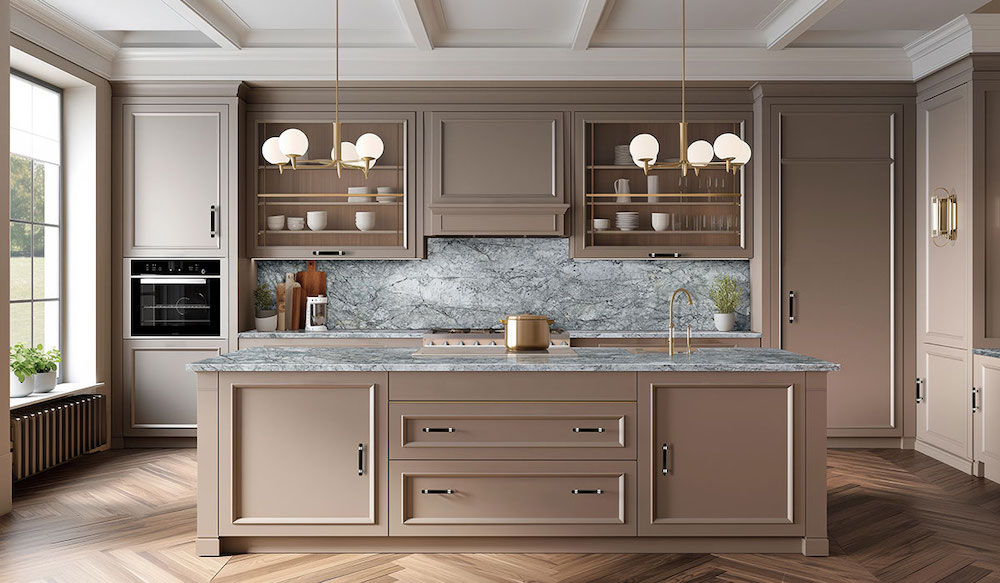 Featured: Azure Mist Granite
Featured: Azure Mist Granite
Granite countertops are a great choice for households that spend a lot of time in their kitchens. The hard stone can withstand high heat and daily wear and tear, and all it takes to clean is soap and water. When sealed correctly, the non-porous surface is a sanitary option because it repels both bacteria and dirt, making it perfect for meal prep. To protect against stains, seal it at least once a year. While granite is very durable, take care around edges and corners, as these areas are more prone to cracking.
On top of its practicality, granite countertops imbue a sense of luxury unique to the stone itself. With thousands of granite colors, these countertops are both beautiful and functional options. The various minerals not only give the stone depth and character but also make every granite top different. This allows you to create a kitchen that?s truly unique, but you will need to select the exact slab you want. Over time, the one-of-a-kind counter will add to the value of your home, and few kitchen countertop surfaces can make the same claim.
Quartzite Countertops
Another countertop option that is gaining in popularity is quartzite, which is commonly confused with quartz. Though similarly named, the two are completely different. Whereas quartz is a man-made material, quartzite is a natural stone. Birthed from sandstone placed under immense heat and pressure, the finished product dazzles observers with its beauty and durability.
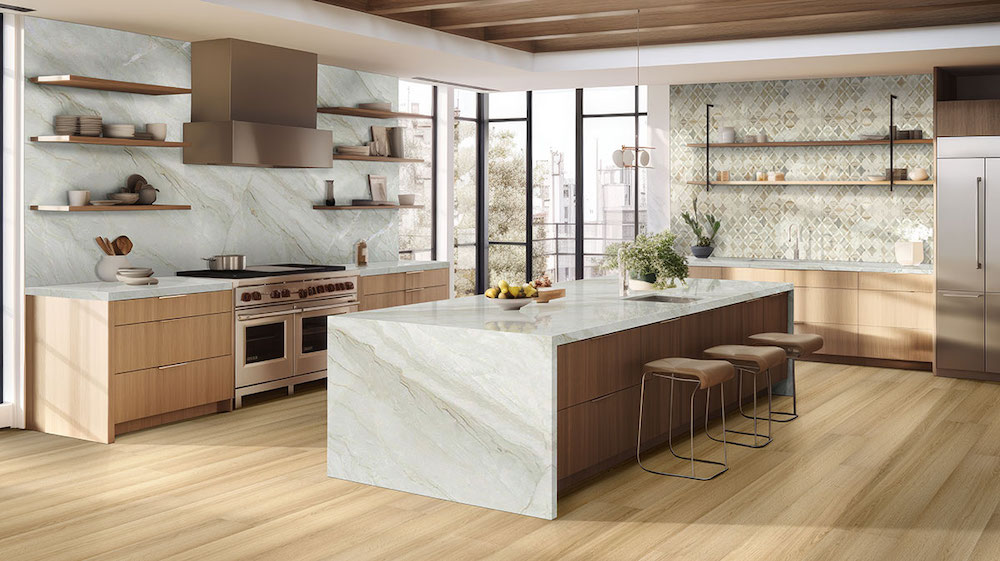 Featured: Milano Quartzite
Featured: Milano Quartzite
Quartzite countertops are another fabulous option for kitchens that see heavier use. Like granite, quartzite is incredibly strong and innately very heat resistant. Believe it or not, quartzite is actually harder than granite and reigns as the strongest of all popular surface stones. It?s also less porous than a lot of other natural options, including granite, and some slabs may even require little to no sealing. Kitchens with lots of windows aren?t a problem either for a quartzite countertop because it?s highly resistant to UV rays and won?t fade in color. When properly cared for, it will effortlessly stand against both time and heavy use.
Since quartzite is a natural stone, every slab is one-of-a-kind. With shades ranging from white to beige to gray, it offers a more subtle neutral look and has fewer flecks or spots than granite. Thanks to its striking veining and beautiful colors, it provides a similar timeless appeal as marble, but with far less upkeep. That?s perfect for those seeking an elegant look that can stand up to heavy use.
Marble Countertops
Seeing a marble countertop for the first time is truly breathtaking. Marble is cherished for its timeless elegance and is often regarded as a luxurious choice that enhances any space. Its beauty and desirability can boost your home?s value, but do keep in mind that it is also among the pricier options out there.
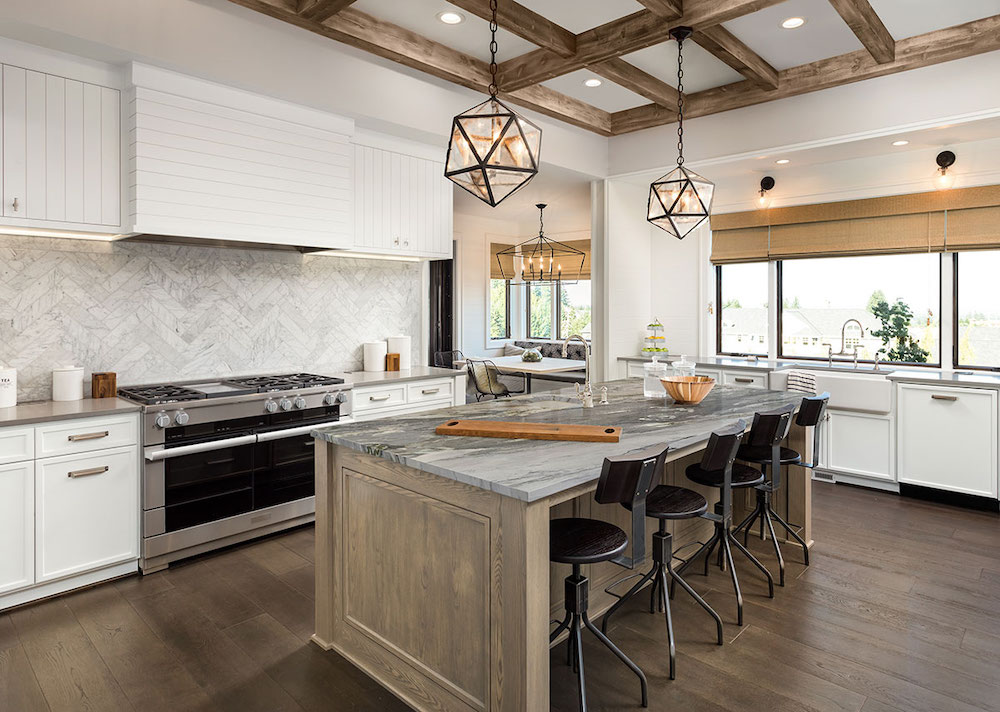 Featured: Portinari Marble
Featured: Portinari Marble
Unlike hardy quartzite and granite, marble is softer and more prone to damage, so it’s good to keep in mind. It needs extra care and sealing to help prevent stains, scratches, chips, and etching, but any nicks or scratches can usually be buffed out easily. While it’s not delicate, marble might not be the best choice for a busy kitchen if you’re a professional chef or someone who cooks a lot. That?s because water, other liquids, and acidic substances can stain or etch the surface if spilled and not cleaned up quickly. On the brighter side, pastry chefs and home bakers love it because the natural stone stays cool, which is ideal for rolling out dough. Over time, marble develops a charming patina that many find adds to its character, so instead of trying to keep it perfect, try to embrace the lovely signs of use and love. Just remember to use heat protectors to avoid scorching.
Marble is a natural choice for those seeking elegance and luxury. Each piece of stone showcases unique marbling patterns created by mineral deposits and natural colors that are hard to replicate. You’ll find a range of marble types, from grayish backgrounds to white with bold, dramatic veins and striking contrasts between light and dark. However, with thoughtful consideration and care, marble countertops are a timeless, stylish investment that will remain in style no matter what the trend.
Thin Porcelain Slabs
Many think of porcelain for flooring or shower installations, but this newer countertop option, that is rivaling popular quartz, is definitely one to consider. The thin porcelain slabs offer the elegant look of natural stone in a lightweight design but at a fraction of the cost. They can also be installed at a fraction of the time it would take to install other types of countertops, which can help any new build or remodel stay on schedule.
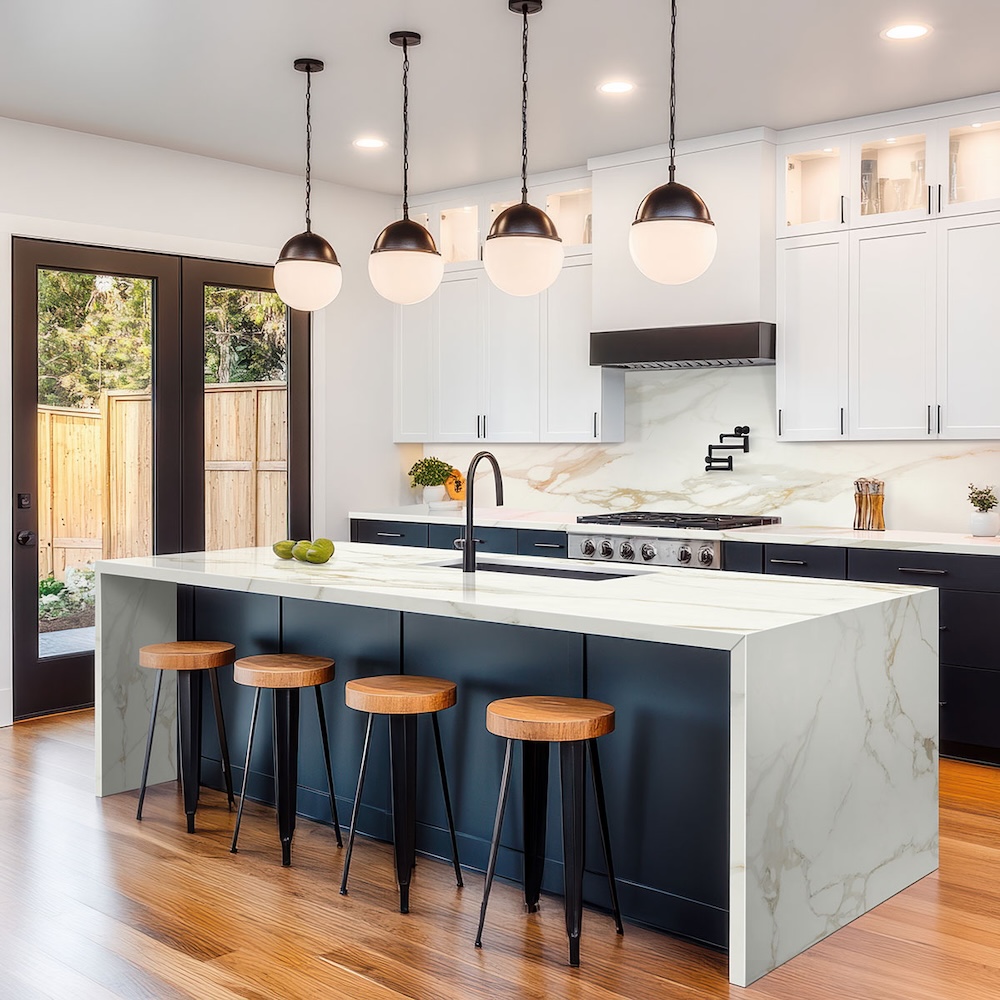 Featured: Calacatta Prici Porcelain Slab
Featured: Calacatta Prici Porcelain Slab
Porcelain slabs are significantly lighter than other natural stone countertops, weighing in at approximately 2.5 and 6 pounds per square foot. An out-of-date kitchen can quickly be transformed into a scrumptious cooking space with this lightweight material because thin porcelain can be installed right on top of an old, outdated counter. Porcelain slabs are engineered to be as tough as quartz and resist etching, stains, and heat. These super durable, smooth surfaces are incredibly low maintenance, and since they’re non-porous, they’re resistant to bacteria and germs. They also have very few grout lines, making them a cinch to clean. However, do your research on installation – not all fabricators are experienced with this material because it’s so new.
These beautiful surfaces are available in a lovely variety of colors and natural textures that resemble other natural stone countertops. Thanks to the stylish choices, thin porcelain slabs can enhance many different design styles and even be used as a nearly seamless backsplash. The large panels provide a sleek look that pairs wonderfully with a modern vibe or adds a fresh, contemporary feel to more traditional spaces. All in all, it?s an affordable and quick way to refresh your kitchen and give it a stunning new look.
Soapstone Countertops
Looking for a low-maintenance option that looks luxurious but won’t break the bank? A soapstone countertop might be just what you need. It?s a natural stone made from metamorphic rock, and the presence of talc gives it a soft, soapy texture ? which is where its name comes from. Unlike other natural stones, soapstone is non-porous, meaning it won’t absorb spills or liquids. That?s why it?s often used in labs, where cleanliness is crucial.
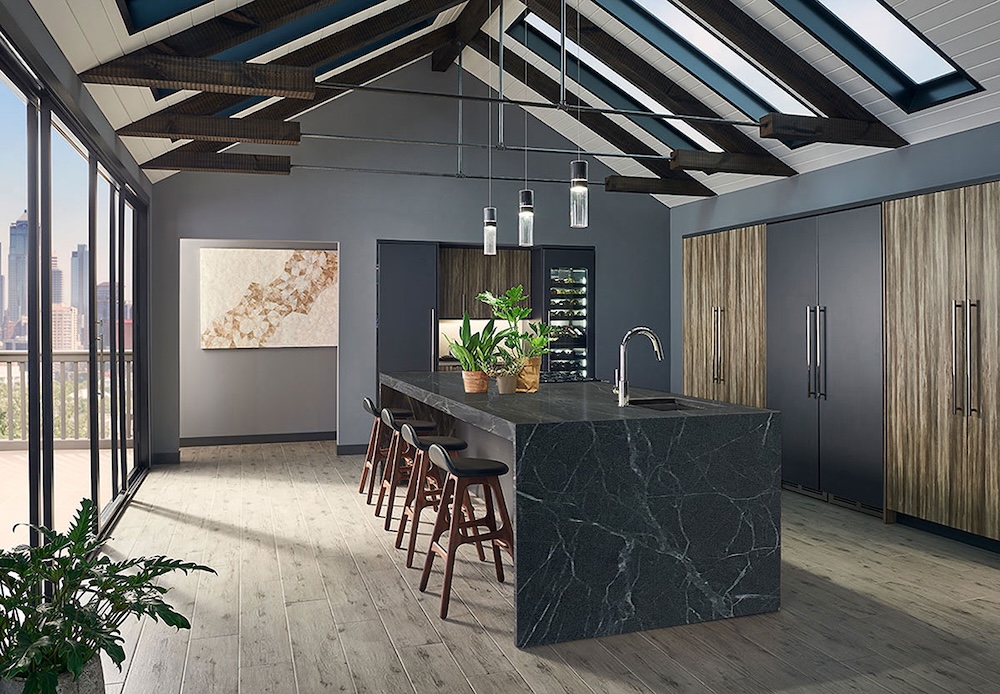 Featured: Black Soapstone Countertop
Featured: Black Soapstone Countertop
Soapstone countertops are ideal for those kitchens that see a bit more mess than average. Families are also fond of the stone because it serves as a cooking space, science lab, craft area, homework area, and workshop all in one. Soapstone surfaces can be wiped up using a simple solution of soap and water and requires little upkeep beyond casual cleaning and the occasional spot check for scratches. The very non-porous surface does not require sealing, which may be surprising for a natural stone. Another plus is that it?s pliable or less brittle, so the countertop won?t crack unexpectedly from stress or weight.
Unlike granite, soapstone slabs offer a limited palette of colors ranging from gray, blue-ish gray, green, and black, depending on the mineral content of that particular deposit. The countertop surface is favored in modern farmhouse kitchens, although they can be installed in spaces with any style, from traditional to modern to eclectic. One of the reasons it may better suit a country or farmhouse style is because it requires periodic oiling in order for it to look its best, as mineral oil can take care of any scratches. The wear and care causes a natural patina to occur over the years, and it?s this rustic, worn quality that many find alluring.
Butcher Block Countertops
Stepping away from natural stone, butcher block countertops have been gaining traction fast, and for a good reason. They offer a warm, classic look and make for a dream workspace for food prep, thanks to their softer, solid wood surface that’s perfect for cutting and chopping. Maple is one of the more common woods used, but others might also include exotic options like teak. Of course, this range in wood varieties also means butcher block countertops vary in price.
Keep in mind that butcher block countertops aren?t perfect for everyone. If you?re looking for a surface that stays pristine, remember that butcher block will naturally develop a warm patina over time, which can change its appearance. It does require a bit more attention, as heat can damage it and cuts or scrapes tend to show easily. But with gentle care, these countertops can last for many years. The porous wood needs regular treatments with mineral oil or beeswax, though varnish can help resist stains a bit better. If burns or scratches happen, simply sanding and reapplying oil can make them less noticeable. You might find that butcher block works best for a kitchen island without plumbing, since installing around a sink or dishwasher could cause humidity changes that make the wood expand or contract.
Homeowners are increasingly drawn to natural elements like wood tones to add warmth and a cozy feel to their spaces. While some prefer a surface without imperfections, others appreciate the evolving look that reveals the countertop’s character and tells a story of its use. Butcher block is also a highly customizable countertop option, making it easier to install, repair, and adapt to different spaces than stone slabs.
Stainless Steel Countertops
Stainless steel is a hidden gem in modern and contemporary kitchens, but its journey to popularity wasn?t always smooth. At one point, stainless steel countertops were seen as too sterile and cold for home decor. But stainless steel is a versatile material that complements almost any style.
In addition to its attractive appearance, stainless steel is highly practical for busy kitchens. As the name indicates, it won?t stain and is very durable, just like steel is known for. The countertop also withstands heat, which is ideal for active cooking areas. Furthermore, it isn?t porous, so moisture, microbes, and other grime won?t find a foothold on this surface. Simply clean it regularly with disinfectant, and you?re all set. However, it isn?t entirely indestructible. Dents and scratches can easily show, as can fingerprints?possibly not the best option for a household with little kids. Be cautious when cleaning, since some chemicals like drain cleaners and products for hard water deposits can discolor the countertop. To maintain its shine, you can use white vinegar and olive oil or another stainless steel cleaner.
Similar to butcher block, stainless steel countertops are designed to develop a unique look over time. They offer a sleek appearance and can be paired with stainless steel appliances or mixed with other metals in the design. Steel may show wear after years of use, but for those whose kitchen visions involve heavy use, stainless steel remains an excellent choice.
Which Countertop is Right for You?
Modern kitchens are often on full display, thanks to the growing popularity of open-concept plans that complement stylish living spaces. Beyond their sleek design, these cooking spaces need to be sturdy and functional, handling a lot of daily wear and tear ? and that includes the countertops. With a wide range of options available, these kitchen countertops are a great starting point for your next remodel or new build. They’re not only durable and timeless, but also have staying power. Their combination of function and fashion can take your kitchen to the next level and make it the envy of the neighborhood!
If you need more help deciding which countertop is right for you or need assistance finding where to buy a kitchen countertop, contact our experts using the chat feature, visit an MSI showroom, or locate an authorized MSI dealer near you today.
